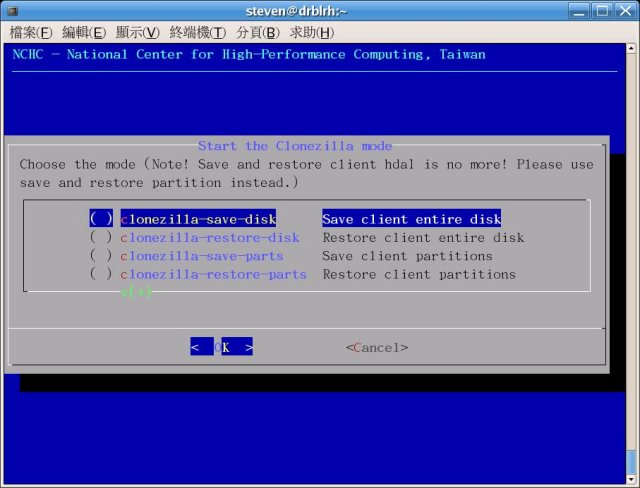Clonezilla is an Open Source partition, disk imaging, and cloning program similar to True Image or Norton Ghost.
Clonezilla is an Open Source partition, disk imaging, and cloning program similar to True Image or Norton Ghost.
It helps you to do system deployment, bare metal backup, and recovery. Clonezilla live is suitable for single machine backup and restore. While it is for massive deployment, it can clone many (40 plus!) computers simultaneously. It saves and restores only used blocks on the hard disk. This increases the cloning efficiency. With some high-end hardware in a 42-node cluster, a multicast restoring rate of 8 GB/min was reported.
Clonezilla Features:
Filesystem supported: (1) ext2, ext3, ext4, ReiserFS, reiser4, xfs, jfs, btrfs of GNU/Linux, (2) FAT12, FAT16, FAT32, NTFS of MS Windows, (3) HFS+ of Mac OS, (4) UFS of FreeBSD, NetBSD, and OpenBSD, (5) minix of Minix, and (6) VMFS3 and VMFS5 of VMWare ESX. Therefore you can clone GNU/Linux, MS Windows, Intel-based Mac OS, FreeBSD, NetBSD, OpenBSD, Minix, and VMWare ESX, no matter its 32-bit (x86) or 64-bit (x86-64) OS. For these file systems, only used blocks in a partition are saved and restored. For an unsupported file system, sector-to-sector copy is done by dd in Clonezilla.
LVM2 (LVM version 1 is not) under GNU/Linux is supported.
Bootloader, including Grub (version 1 and version 2) and syslinux, could be reinstalled.
Both MBR and GPT partition formats of hard drives are supported. Clonezilla Live also can be booted on a BIOS or uEFI machine.
Unattended mode is supported. Almost all steps can be done via commands and options. You can also use a lot of boot parameters to customize your imaging and cloning.
One image restoring to multiple local devices is supported.
Multicast is supported in SE, which is suitable for a massive clone. You can also remotely use it to save or restore many computers if PXE and Wake-on-LAN are supported by your clients.
The image file can be on local disk, ssh server, samba server, or NFS server.
Based on Partclone (default), Partimage (optional), ntfsclone (optional), or dd to image or clone a partition. However, Clonezilla, containing some other programs, can save and restore partitions and a whole disk.
Using another free software, drbl-winroll, which is also developed by us, the hostname, group, and SID of cloned MS windows machine can be automatically changed.
Similar:
How to Reset or Reinstall Windows 10 Using the Cloud (Step-by-Step)
How to Automatically Back up the Registry on Windows 10 & 11
How to Back up or Restore the Windows Registry
How To Backup and Restore Your Drivers
How to Back Up Google Drive
Download


